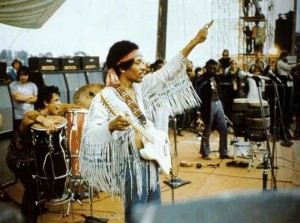Generational & Cultural Gaps 40 Years After Woodstock
 The Woodstock festival, and the late 1960’s in general, marked a time where generational fractures & cultural clashes were prevalent in American society.
The Woodstock festival, and the late 1960’s in general, marked a time where generational fractures & cultural clashes were prevalent in American society.
This new comprehensive report from the Pew Research Center indicates that there are still substantial differences between younger and older adults in their values, use of technology, work ethics and respect and tolerance for others. However, today’s generation gap is a lot gentler than the culture war raging in 1969.
Beside the political aspects of Woodstock such as the protest against the Vietnam war associated with the “peace & love” movement; the main cultural element of generational conflict was Rock & Roll. Forty years ago, Rock & Roll represented protest, rebellion & counterculture, it has since then completely moved to mainstream culture.
More than 2/3 of respondents to the survey said they listen to Rock & Roll often ( 35 percent) or sometimes ( 30 percent); placing it ahead of other music genres such as Country, R & B, Hip-Hop, Classical, Jazz & Salsa. In contrast, back in 1966 a survey found that Rock & Roll was by far the most unpopular music in America; with 44 percent of adult saying they disliked the music, and only 4 percent saying it was their favorite music.
Beside Rock & Roll, another key finding of the survey concerns conflicts between social groups. The survey finds that only 26 percent of the public sees strong conflicts between young people and older people. By contrast, 55 percent of the public sees strong conflicts between immigrants & native born; 47 percent between rich & poor and 39 percent between Blacks & Whites.
Seven in ten respondents of the survey were able to correctly identify what Woodstock was, but among respondents ages 16 to 24 only about half could.
The colorful descriptions of Woodstock by survey respondents is an illustration of the passions & polarization of 1969. Some called it “a hippie drug fest’, “a total moral mess”, “wild kids having sex”. The other side saw it as “a love-in”, “a celebration of freedom & new ideas”, “a peace festival bringing unity & togetherness.”
For the complete report from the Pew Research Center click here.
Related Articles













One Response to Generational & Cultural Gaps 40 Years After Woodstock
You must be logged in to post a comment Login